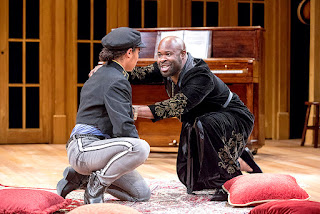The play centers on twins Viola and Sebastian, who are separated in a
shipwreck. Viola (who is disguised as Cesario) falls in love with Duke Orsino,
who in turn is in love with the Countess Olivia. Upon meeting Viola, Countess
Olivia falls in love with her, thinking she is a man.
Viola is shipwrecked on the coast of Illyria, and she comes ashore with the
help of a captain. She has lost contact with her twin brother, Sebastian, who
she believes to have drowned. With the aid of the captain, she disguises
herself as a young man named Cesario, and enters the service of Duke Orsino.
Duke Orsino is in love with the Countess Olivia, who is mourning the recent
deaths of her father and brother. She refuses to see entertainment, be in the
company of men, or accept love or marriage proposals from anyone (the Duke
included) until seven years have passed. Duke Orsino uses Cesario as an
intermediary to profess his passionate love for Olivia. Olivia, however, falls
in love with Cesario. In the meantime, Viola has fallen in love with the Duke
Orsino, creating a love triangle among Duke Orsino, Olivia, and Viola: Viola
loves Duke Orsino, Duke Orsino loves Olivia, and Olivia loves Viola disguised
as Cesario.
In the comic subplot, several characters conspire to make Olivia's pompous
steward, Malvolio, believe that Olivia has fallen for him. This involves
Olivia's riotous uncle (Sir Toby Belch), another would-be suitor (a silly
squire named Sir Andrew Aguecheek), her servants (Maria and Fabian); and her
melancholy fool (Feste). Sir Toby and Sir Andrew engage themselves in drinking
and revelry, thus disturbing the peace of Olivia's household until late into
the night, prompting Malvolio to chastise them.
Sir Toby, Sir Andrew, and Maria plan revenge on Malvolio. They convince
Malvolio that Olivia is secretly in love with him by planting a love letter,
written by Maria in Olivia's handwriting. It asks Malvolio to wear yellow
stockings cross-gartered and to smile constantly in the presence of Olivia.
Malvolio finds the letter and reacts in surprised delight. He starts acting out
the contents of the letter to show Olivia his positive response. Olivia is
shocked by the changes in Malvolio, and agreeing that he seems mad, leaves him
to be cared for by his tormentors. Pretending that Malvolio is insane, they
lock him up in a dark chamber. Feste visits him to mock his insanity, both
disguised as a priest and as himself.
Meanwhile, Viola's twin Sebastian has been rescued by Antonio, a sea
captain who previously fought against Duke Orsino, yet who accompanies
Sebastian to Illyria, despite the danger, because of his affection for
Sebastian. Sebastian's appearance adds the confusion of mistaken identities to
the comedy. Taking Sebastian for Cesario, Olivia asks him to marry her, and
they are secretly wed in a church. Finally, when Cesario and Sebastian appear in
the presence of both Olivia and Orsino, there is more wonder and confusion at
their physical similarity. At this point, Viola reveals her identity and is
reunited with her twin brother.
The play ends in a declaration of marriage between Duke Orsino and Viola,
and it is learned that Sir Toby has married Maria. Malvolio swears revenge on
his tormentors and stalks off, but Orsino sends Fabian to placate him.














